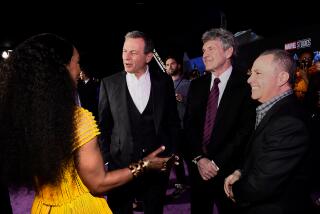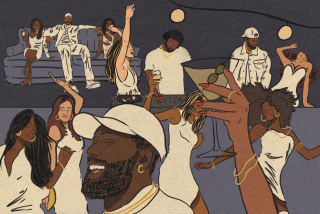Black Charges of Jewish Racism in the Entertainment Industry
- Share via
We feel we must comment on your editorial on the NAACP convention (“Who Needs This Kind of Thing?” July 13). Unfortunately, it was more than a little biased, and slightly inaccurate.
First, your suggestion that the executive director of our organization and the chairman of the board “were divided” in their response to what was said by a panelist is inaccurate. That is untrue! We issued a joint statement describing our exact sentiments on the matter. However, your editorial left the absurd notion that we, or the NAACP as an organization, had to “endorse” or be in accord with a convention workshop panelist simply because he presented a personal point of view on an issue of importance to the association.
There were over 29 workshops, featuring more than 112 panelists, each with the freedom to voice his or her views on the issue the panel was attempting to address.
The suggestion that we can or should control what workshop panelists, or speakers, at our conventions say is a direct contradiction of what the NAACP has fought for over the past 81 years.
We totally disassociate the NAACP from the remarks about alleged “Jewish racism” in the entertainment industry. We do not feel that any one group is responsible for the almost total exclusion of blacks from the decision-making ranks of the film and music industry. It is inconceivable that anyone could deny the existence of racism in an industry that after 80 years in business cannot point to one black who can give a green light to a film, hire or fire a producer or director--or sign a development deal.
We would be remiss if we were to close without mentioning your error regarding the makeup of the panel. Only four of the seven panelists actually work in the entertainment industry, not six as you stated. One of those non-industry workers is a publisher, who was invited because of his inside knowledge and understanding of the music industry. The other two were invited because they represent media watchdog organizations, who have compiled unique information and statistics on the two industries. Their inclusion was, therefore, consistent with the thrust of the seminar.
Yes, Virginia, there is racism in the film and music industry. That small truth was the reason that the more than 1,000 people at that workshop stood and applauded. They were not agreeing with the charge of “Jewish racism,” but concurring that insensitive hiring practices permeate the industry. Their applause signaled a cry for someone to start doing something about it.
In closing, we would like to remind you that no great institution can long survive by closing its ears to opposing points of view. The fact, however, that the Afro-American community is not a monolithic voice, but represents a montage of sentiment and expression, will not hinder us from working with our Jewish brothers and sisters with whom we have been in the struggle for so many years.
WILLIAM F. GIBSON
Chairman, NAACP Board of Directors
BENJAMIN L. HOOKS
Executive Director, CEO, NAACP
Baltimore
More to Read
The biggest entertainment stories
Get our big stories about Hollywood, film, television, music, arts, culture and more right in your inbox as soon as they publish.
You may occasionally receive promotional content from the Los Angeles Times.










